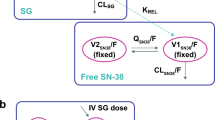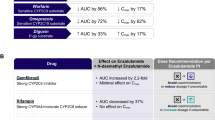Summary
Background: ASP9521 is a first-in-class orally available inhibitor of the enzyme 17 β-hydroxysteroid dehydrogenase type 5 (17 βHSD5; AKR1C3), catalysing the conversion of dehydroepiandrosterone and androstenedione into 5-androstenediol and testosterone. It has demonstrated anti-tumour activity in in vitro and in vivo preclinical models. Material and methods: This first-in-man phase I/II study utilised a 3 + 3 dose escalation design starting at 30 mg ASP9521/day, with the aim of defining a maximum tolerated dose, as defined by the incidence of dose-limiting toxicities. Eligible patients received ASP9521 orally for 12 weeks. Safety, tolerability, pharmacokinetics (PK), pharmacodynamics and anti-tumour activity were assessed. Results: Thirteen patients (median age: 68 years; range 52–76) with metastatic castration-resistant prostate cancer (mCRPC) progressing after chemotherapy were included; 12 patients discontinued treatment at or before week 13, mainly due to disease progression. The most common adverse events were grade 1/2 and included asthenia (N = 5), constipation (N = 4), diarrhoea (N = 3), back pain (N = 3) and cancer pain (N = 3). PK demonstrated a half-life (t1/2) ranging from 16 to 35 h, rapid absorption and dose proportionality. No biochemical or radiological responses were identified; neither endocrine biomarker levels nor circulating tumour cell counts were altered by ASP9521. Given the lack of observable clinical activity, the study was terminated without implementing a planned 12-week dose expansion part at selected doses or a planned food-effect study part. Conclusions: In patients with mCRPC, ASP9521 demonstrated dose-proportional increase in exposure over the doses evaluated, with an acceptable safety and tolerability profile. However, the novel androgen biosynthesis inhibitor showed no relevant evidence of clinical activity.




Similar content being viewed by others
References
Horwich A, Hugosson J, de Reijke T, Wiegel T, Fizazi K, Kataja V, Panel Members (2013) Prostate cancer: ESMO consensus conference guidelines 2012. Ann Oncol 24:1141–1162. doi:10.1093/annonc/mds624
Heidenreich A, Bastian PJ, Bellmunt J, Bolla M, Joniau S, Mason MD, Matveev V, Mottet N, van der Kwast TH, Wiegel T, Zattoni F (2013) EAU guidelines on prostate cancer. Update March 2013. European Association of Urology. http://www.uroweb.org/guidelines/online-guidelines/. Accessed 14 November 2013
Harris WP, Mostaghel EA, Nelson PS, Montgomery B (2009) Androgen deprivation therapy: progress in understanding mechanisms of resistance and optimizing androgen depletion. Nat Clin Pract Urol 6:76–85
Massard C, Fizazi K (2011) Targeting continued androgen receptor signaling in prostate cancer. Clin Cancer Res 17:3876–3883
Yepuru M, Wu Z, Kulkarni A, Yin F, Barrett CM, Kim J, Steiner MS, Miller DD, Dalton JT, Narayanan R (2013) Steroidogenic enzyme AKR1C3 is a novel androgen receptor-selective coactivator that promotes prostate cancer growth. Clin Cancer Res 19:5613–5625
Stanbrough M, Bubley GJ, Ross K, Golub TR, Rubin MA, Penning TM, Febbo PG, Balk SP (2006) Increased expression of genes converting adrenal androgens to testosterone in androgen-independent prostate cancer. Cancer Res 66:2815–2825
Hamid ARAH, Pfeiffer MJ, Verhaegh GW, Schaafsma E, Brandt A, Sweep FCGJ, Sedelaar JPM, Schalken JA (2012) Aldo-keto reductase family 1 member C3 (AKR1C3) is a biomarker and therapeutic target for castration-resistant prostate cancer. Mol Med 18:1449–1455
Pfeiffer MJ, Smit FP, Sedelaar JPM, Schalken JA (2011) Steroidogenic enzymes and stem cell markers are upregulated during androgen deprivation in prostate cancer. Mol Med 17:657–664
Yu CC, Huang SP, Lee YC, Huang CY, Liu CC, Hour TC, Huang CN, You BJ, Chang TY, Huang CH, Bao BY (2013) Molecular markers in sex hormone pathway genes associated with the efficacy of androgen-deprivation therapy for prostate cancer. PLoS One 8:e54627
Mostaghel EA, Marck BT, Plymate SR, Vessella RL, Balk S, Matsumoto AM, Nelson PS, Montgomery RB (2011) Resistance to CYP17A1 inhibition with abiraterone in castration-resistant prostate cancer: induction of steroidogenesis and androgen receptor splice variants. Clin Cancer Res 17:5913–5925
Cai C, Chen S, Ng P, Bubley GJ, Nelson PS, Mostaghel EA, Marck B, Matsumoto AM, Simon NI, Wang H, Chen S, Balk SP (2011) Intratumoral de novo steroid synthesis activates androgen receptor in castration-resistant prostate cancer and is upregulated by treatment with CYP17A1 inhibitors. Cancer Res 71:6503–6513
Adeniji AO, Chen M, Penning TM (2013) AKR1C3 as a target in castrate resistant prostate cancer. J Steroid Biochem Mol Biol 137:136–149
Kikuchi A, Enjo K, Furutani T, Azami H, Nimi T, Kuromitsu S, Kamiyma Y (2013) ASP9521, a novel, selective, orally bioavailable AKR1C3 (type 5,17β-hydroxysteroid dehydrogenase) inhibitor: In vitro and in vivo characterization. J Clin Oncol 31 (15S):319 s (abs.5046)
Watanabe K, Kakefuda A, Yasuda M, Enjo K, Kikuchi A, Furutani T, Naritomi Y, Otsuka Y, Okada M, Ohta M (2013) Discovery of 2-methyl-1-{1-[(5-methyl-1H-indol-2-yl) carbonyl] piperidin-4-yl} propan-2-ol: A novel, potent and selective type 5 17β-hydroxysteroid dehydrogenase inhibitor. Bioorg Med Chem 21:5261–5270
Therasse P, Arbuck SG, Eisenhauer EA, Wanders J, Kaplan RS, Rubinstein L, Verweij J, Van Glabbeke M, van Oosterom AT, Christian MC, Gwyther SG (2000) New guidelines to evaluate the response to treatment in solid tumors. J Natl Cancer Inst 92:205–216
Chang KH, Li R, Papari-Zareei M, Watumull L, Zhao YD, Auchus RJ, Sharifi N (2011) Dihydrotestosterone synthesis bypasses testosterone to drive castration-resistant prostate cancer. Proc Natl Acad Sci U S A 108:13728–13733
Mohler JL, Titus MA, Bai S, Kennerley BJ, Lih FB, Tomer KB, Wilson EM (2011) Activation of the androgen receptor by intratumoral bioconversion of androstanediol to dihydrotestosterone in prostate cancer. Cancer Res 71:1486–1496
Acknowledgments
The authors are grateful Ismar Healthcare NV for medical writing assistance funded by Astellas Pharma Europe BV. The study was funded by Astellas Pharma Europe BV.
Ethical approval
Independent ethics committee (IEC) approval was obtained at each study site. The study was conducted in accordance with the ethical principles that have their origin in the Declaration of Helsinki, Good Clinical Practice, International Conference on Harmonisation guidelines and applicable laws and regulations of the involved institutions and countries. All patients included in the study signed an IEC-approved written informed consent before the conduct of any study procedures and after a full explanation of the study to the patient by a study investigator.
Conflicts of interest statement
Y Loriot received a research grant from Astellas and is principal investigator of the PREVAIL study at Institute Gustave Roussy.
K Fizazi participated to advisory boards for Astellas-Medivation, Janssen-Cougar, Orion, Sanofi-Aventis, Bayer and Amgen.
RJ Jones has received speaker’s honoraria and has acted as a consultant to Astellas. He also received research funding from Astellas.
J Van den Brande has no conflicts of interest.
LR Molife has no conflicts of interest.
A Omlin has no conflicts of interest.
ND James has no conflicts of interest.
JS De Bono served as a paid advisor to Astellas.
E Baskin-Bey, M Heeringa, B Baron, T Ouatas and GM Holtkamp are employees of Astellas Pharma Europe BV.
Author information
Authors and Affiliations
Corresponding author
Rights and permissions
About this article
Cite this article
Loriot, Y., Fizazi, K., Jones, R.J. et al. Safety, tolerability and anti-tumour activity of the androgen biosynthesis inhibitor ASP9521 in patients with metastatic castration-resistant prostate cancer: multi-centre phase I/II study. Invest New Drugs 32, 995–1004 (2014). https://doi.org/10.1007/s10637-014-0101-x
Received:
Accepted:
Published:
Issue Date:
DOI: https://doi.org/10.1007/s10637-014-0101-x




